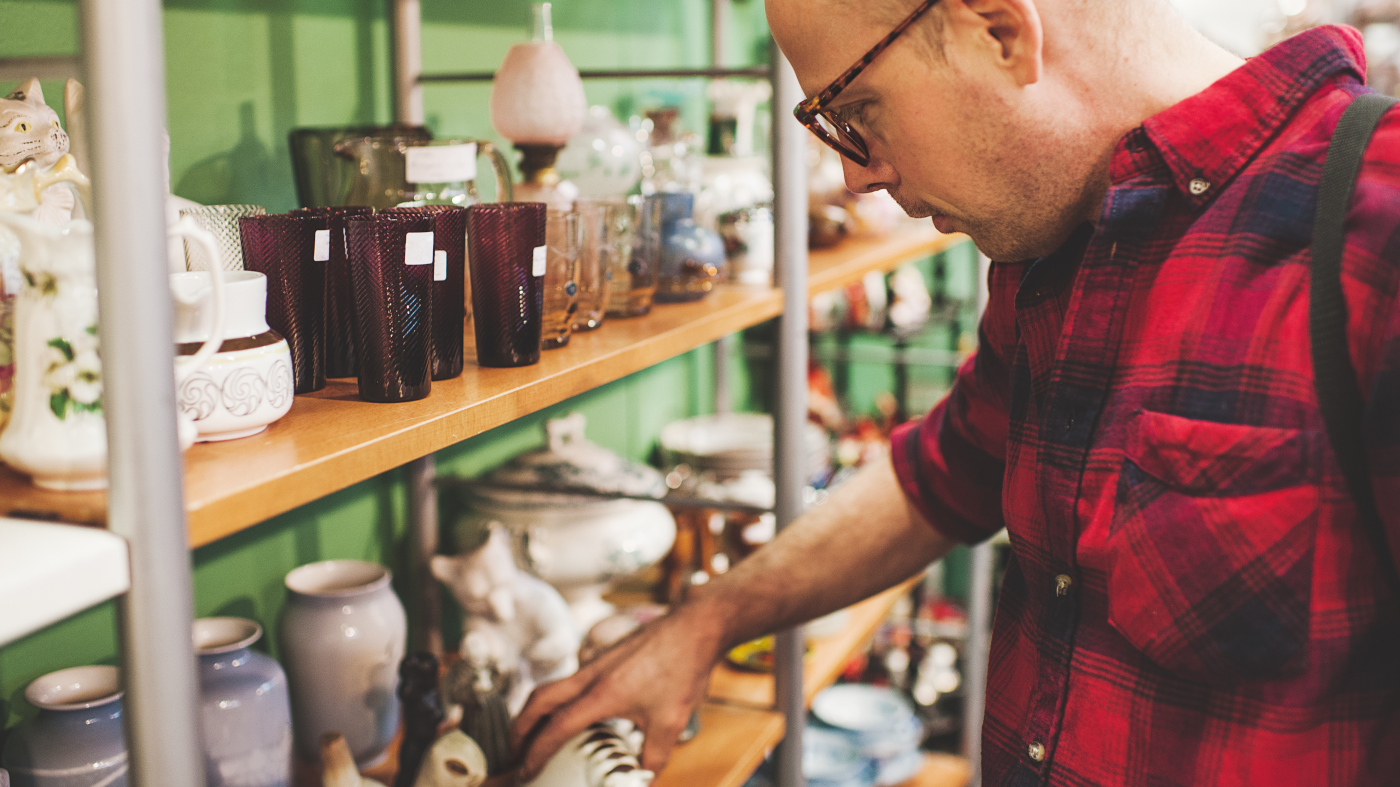Whether you’re looking to earn some extra money on top of your freelancing income, or develop a full time self-employed career, reselling (also known as retail arbitrage) can be a quick and easy way to get started. Find out how to start a reseller side hustle and potentially benefit from having flexible hours and specialist knowledge as a freelancer.
Lots of people will sell their unwanted items through eBay, Facebook marketplace, or platforms like Depop and Vinted. But you can take it further by investing in new or second-hand products on a regular basis, and selling them on for a profit.
- What is reselling or retail arbitrage?
- Where to find products as a reseller?
- How to sell products as a reseller?
- Growing your reseller business
- Other freelance side hustles to earn extra income
What is reselling or retail arbitrage?
Reselling or retail arbitrage means that you’re buying products from various sources or suppliers, and then reselling them. As a business model, it’s existed for centuries. But it’s more popular than ever because online platforms mean there’s no need to rent a shop and spend time behind a till to sell whatever you’ve found.
This means anyone can get started quickly and easily. And you can start reinvesting any profits to secure more stock and build up your profile.
Products for resale can come from anywhere, whereas retail arbitrage concentrates on the difference between sales prices on new products, allowing you to potentially make a profit on the difference. For example, buying new items for £5 from a supermarket if you know you’re likely to sell them for £20 on Amazon.
The benefit over starting an eCommerce side hustle is that you don’t need to invest in creating or sourcing large amounts of stock. And you can earn a higher rate than what may be available through drop shipping or print-on-demand.
It’s a particularly good niche if you have a strong interest or expertise in specific markets, from children’s toys to vintage collectables. But various free and paid tools can help you spot opportunities even if you’re not knowledgeable about a particular product, for example, the Amazon Seller App.

Where to find products as a reseller?
You can find products to sell from an almost endless range of sources. The most important factors will be the demand for the item, and whether you can make enough of a profit for it to be worthwhile.
Some useful places to find products for resale include:
- Charity and second-hand shops.
- Boot fairs and garage sales
- Online marketplaces: If you can spot items which are under-priced or mislabelled, you may be able to flip them quickly by relisting them correctly.
- Supermarkets and other offline retail shops: With any retail building, space will be at a premium. So any retailer will be likely to sell stock cheaply when they need to clear space, allowing you to potentially profit.
- Auctions or liquidations: Along with auctions, stock liquidations can let you pick up products cheaply for resale.
- Return pallets: Various retailers, most notably Amazon, will sell pallets of goods which have been returned by customers. If you’re unlucky, it will all be unsellable junk, but you can also find as-new products.
Some options, such as liquidations and return pallets will generally be handled by wholesalers. So it’s important to check where you’re buying from, descriptions and grades of the contents, and whether you’ll be likely to make a mark-up on the contents.
Whereas boot fairs and garage sales let you see exactly what you’re investing in. But you’ll need to get up early and compete with other semi-professional traders to secure the best bargains.
While selling the odd personal item isn’t an issue, if you’re starting to run a full reseller side-hustle or business, then you’ll have the same tax and legal obligations as for any other self-employed endeavour.
As with any self-employed business or side hustle, making connections with people will help, as you might get tips from shop assistants, auctioneers or wholesalers when a particularly good deal is available. Resellers who specialise in a specific market might also pass on any products which are a better fit for you, if you have a good working relationship with them.
How to sell products as a reseller?
The first stage is to list your products effectively. This involves choosing one or more marketplaces which are suitable for the items you intend to sell, whether that’s Amazon, eBay and Facebook Marketplace for general items, or platforms like Depop and Vinted for clothes and fashion. And there are specialist markets for all kinds of hobbies and interests, whether you’re selling Warhammer figures, radio controlled cars or vintage sewing machines.
You can also sell directly, or promote your listings, on the communities dedicated to relevant hobbies and interests. It’s still possible to make a good income from posting on the right forums, as long as you have products which will sell for a good price.
And there’s nothing to stop you also creating your own online store to resell items, although this will make more sense as your brand and available inventory grows. Various retailers have grown from reselling products, particularly in areas like sneakers and fashion. Some popular brands have agreements with marketplaces that their products can’t be resold, so having your own eCommerce shop gets around this issue.
When you’ve chosen one or more marketplaces, it’s important to spend time and effort to describe your products effectively with headlines and descriptions which capture the attention of the buyer, but are honest and informative to avoid negative feedback and reviews. For instance, ‘blue jumper’, vs ‘Navy blue traditional fisherman’s jumper (size large)’.
Photography is also important when buyers are committing to a purchase online. In addition to making items look as good as possible, it’s important to demonstrate any damage or imperfections.
Great product photos don’t need expensive equipment, as long as you have a smartphone with a decent camera and somewhere with good natural light.
The final key to sales will be to establish a good reputation and level of trust with customers, whether by establishing a brand, encouraging positive reviews through good service, or adding value in some way (beautiful packaging, helpful advice or other extras). If you’re able to build a successful and trusted brand, it’ll be much easier to complete sales in the future and potentially expand the business into a full-time occupation.

Growing your reseller business
If you’re just starting to dabble in reselling for some extra money, it will take a little time and effort to learn what products are most likely to sell, and which marketplaces are most effective. Spending some time researching completed sales will help you understand customer demand.
It’s also a good idea to develop an inventory system, and track all of your purchases and sales. This not only means you can keep track of products when it’s time to mail them to customers, but you’ll also be sure that you’re actually making money on each transaction. And when you break even or lose cash, at least you’ll be able to learn from the experience.
After all, it’s pointless investing time and money into a reseller side hustle if it’s not actually making you any money after a short amount of time.
When you’re tracking time and expenses, make sure you include marketplace fees, and shipping costs. This also includes packaging materials, and time spent queueing at the post office. Otherwise it’s easy to find yourself potentially losing time and money by selling products for a lower profit margin than you need.
As you increase your income, there are a variety of items which can help you streamline the buying the selling process, and make shipping easier. You can also start to outsource some of the tasks, or bring in part-time help.
Other freelance side hustles to earn extra income
Looking for ways to earn extra income alongside your self-employed or freelance career? Why not check out some of our other guides to bring in some extra money?






